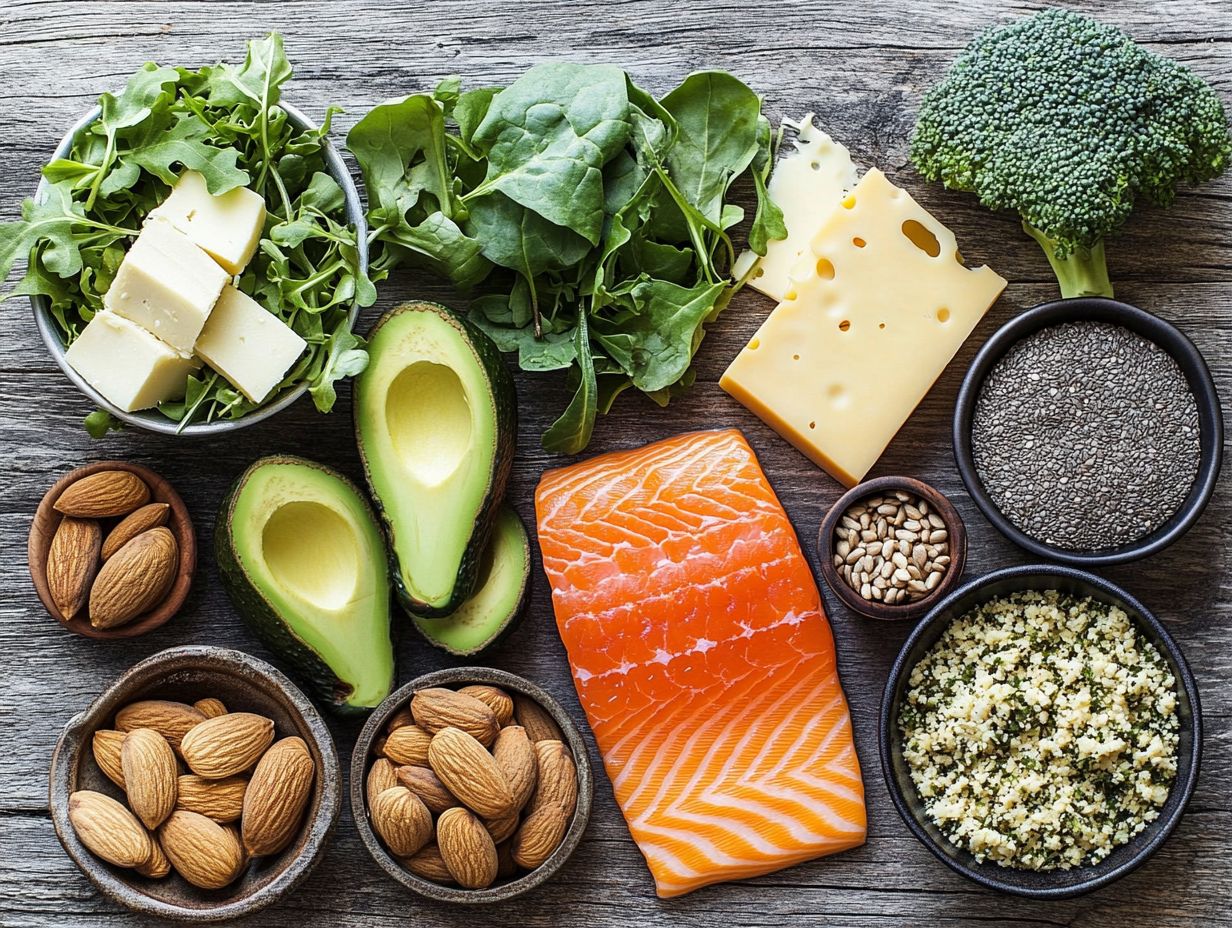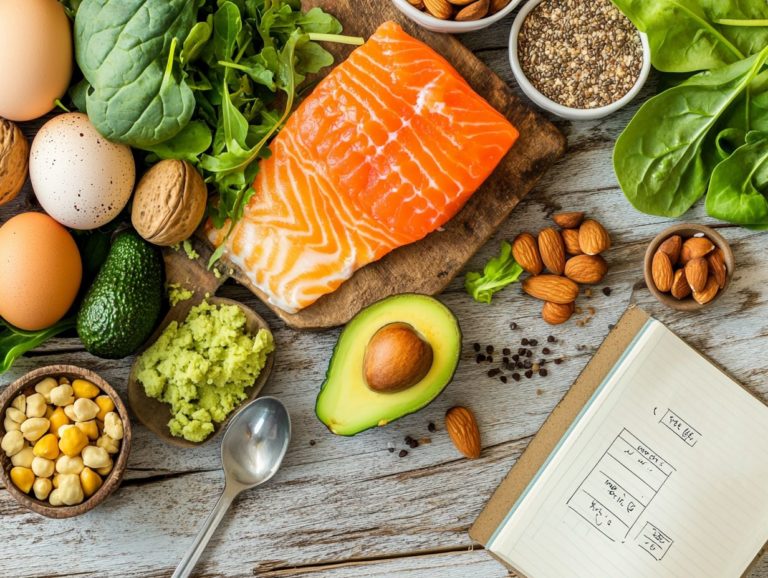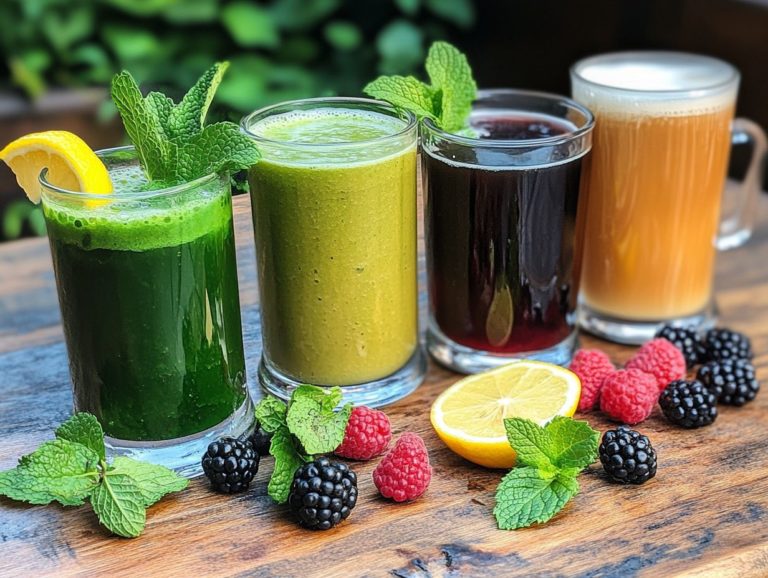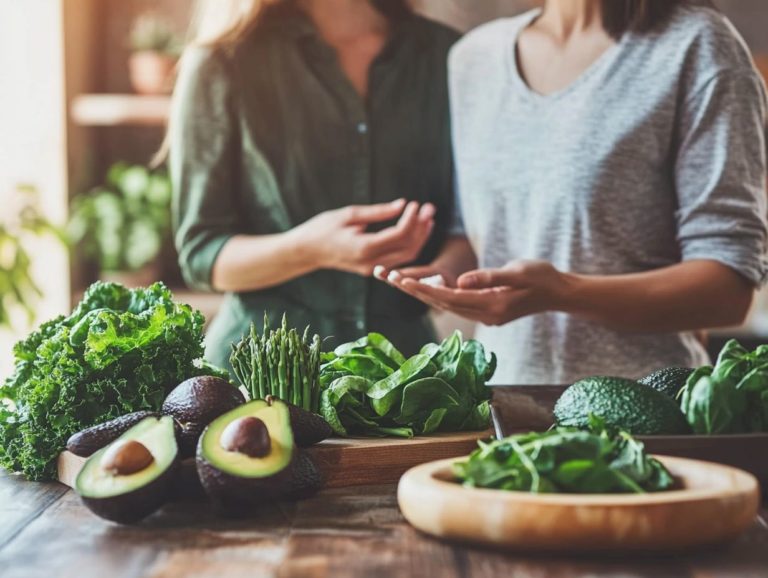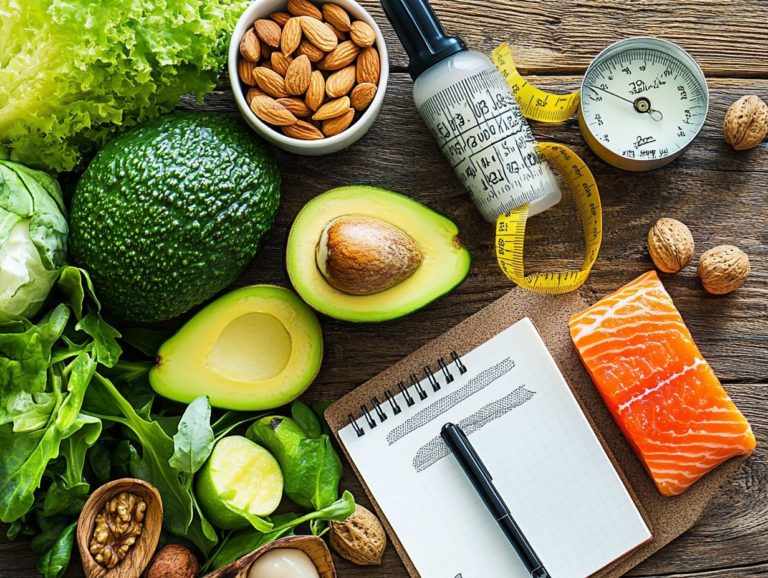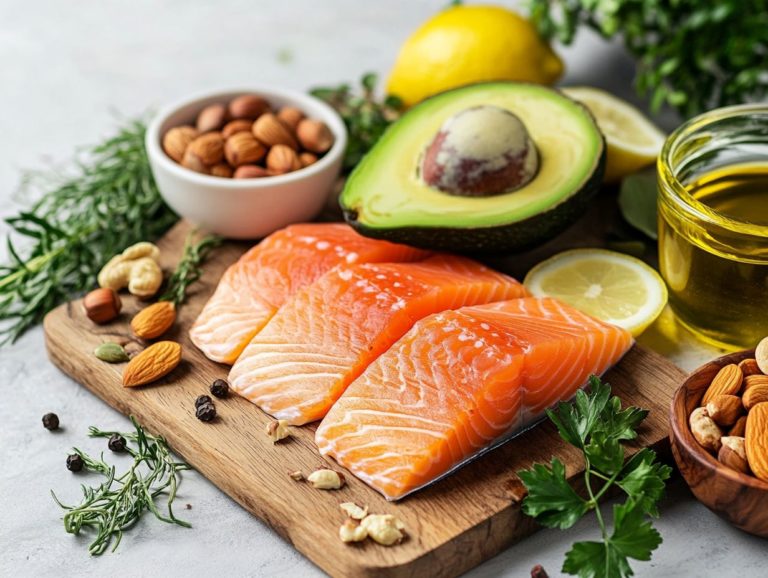Keto Diet: The Best Nutrient Sources
The ketogenic diet has surged in popularity, celebrated for its potential health benefits and impressive weight loss outcomes. To truly excel in this low-carb, high-fat lifestyle, it s crucial for you to select the right nutrient sources while following appropriate diet plans tailored to your needs.
This article delves into the top foods that will help maintain your body in ketosis while supplying essential vitamins and minerals. From healthy fats and low-carb vegetables to high-quality proteins and delightful berries, uncover how to make your keto journey not only nutritious but also genuinely enjoyable! Additionally, we will touch upon other popular diets like the Atkins diet, Paleo diet, South Beach diet, and Dukan diet, and their comparison to the ketogenic diet.
Contents
- Key Takeaways:
- What Are the Best Nutrient Sources for the Keto Diet?
- Frequently Asked Questions
- What is the Keto Diet and why is it important to focus on nutrient sources?
- What are the best nutrient sources for the Keto Diet?
- Can I still get enough nutrients on a Keto Diet without consuming carbohydrates?
- Are there any specific nutrient deficiencies that can occur on a Keto Diet?
- Can I still enjoy fruits and vegetables on a Keto Diet?
- Are there any Keto-friendly supplements that can help with nutrient intake?
Key Takeaways:
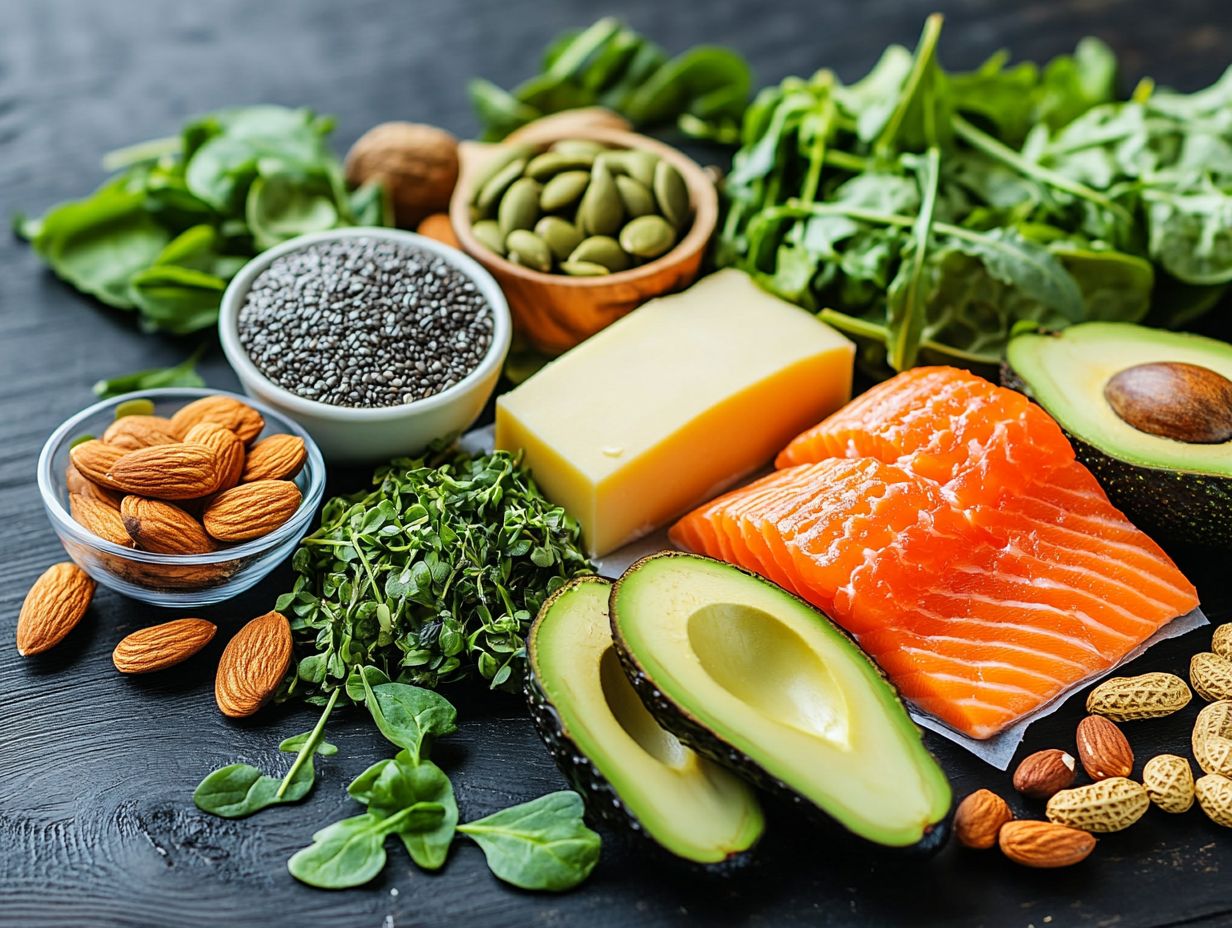
- Incorporating healthy fats like avocado, olive oil, and coconut oil is essential for the keto diet. These fats play a crucial role in energy expenditure and maintaining ketosis.
- Low-carb vegetables such as leafy greens, cruciferous vegetables, and bell peppers provide important micronutrients and fiber intake on a keto diet.
- Choosing high-quality proteins like grass-fed beef, wild-caught salmon, and organic chicken is key for a successful keto diet and optimal protein intake.
What Are the Best Nutrient Sources for the Keto Diet?
When you embark on a ketogenic diet, grasping the best sources of nutrients is essential for achieving optimal health and effective weight loss. The keto diet champions a low-carbohydrate, high-fat approach that not only facilitates fat burning but also fosters overall well-being through the consumption of healthy fats and carefully selected, nutrient-rich foods. It s also important to consider your carbohydrate intake and balance it with your protein and fat intake for maximum benefits.
By prioritizing nutrient-dense options, you can effectively manage your body composition while adhering to dietary guidelines that support ketosis and mitigate any potential adverse effects related to metabolic changes. Monitoring your protein intake and ensuring an adequate fiber intake can further enhance these benefits.
1. Healthy Fats
Healthy fats are the backbone of your ketogenic diet, delivering essential energy and supporting vital bodily functions. By incorporating sources of healthy fats like avocado, olive oil, and coconut oil into your daily meal plans, you not only help maintain ketosis but also enhance your overall health. These fats provide essential fatty acids that assist in managing glucose levels and help with appetite control and insulin resistance.
These healthy fats are crucial for energy expenditure, enabling your body to efficiently burn fat for fuel instead of relying on carbohydrates. This shift not only helps you achieve your desired body composition but also boosts your metabolic flexibility.
Consider adding nuts, seeds, and fatty fish such as salmon to your keto-friendly menu. These foods are packed with omega-3 and omega-6 fatty acids, which are known to improve heart health, reduce inflammation, and promote optimal brain function all while keeping your nutritional balance in check and enhancing the effectiveness of your ketogenic lifestyle. Including high-cocoa chocolate and various dairy products can also enrich your diet with essential macronutrients.
– Avocado
Avocado is a true powerhouse of healthy fats, perfectly aligning with your ketogenic diet while boasting a rich array of micronutrients. This creamy fruit is not just low in net carbs; it s high in monounsaturated fats, making it an exceptional choice for enhancing your body composition and supporting overall health. Moreover, it can help manage insulin resistance and stabilize glucose levels, making it a versatile component of your high-fat diet.
Packed with essential vitamins like E, K, and several B vitamins, avocados contribute to improved skin health, bone density, and energy metabolism. Their impressive fiber content promotes healthy digestion and aids in weight loss by keeping you feeling fuller for longer, effectively curbing those pesky snack cravings.
Additionally, avocados play a vital role in managing insulin resistance, which is crucial for your metabolic health. Incorporating them into your keto meals is both delicious and simple; toss them in salads, blend them into smoothies, or whip them up into guacamole for dipping low-carb veggies.
For a satisfying breakfast, consider trying an avocado egg bake, where eggs are cooked right in halved avocados, perfectly merging flavor and nutrition in one delightful dish.
– Olive Oil
Olive oil stands as a cornerstone of healthy fats in the ketogenic diet, celebrated for its myriad health benefits and culinary versatility. As a robust source of monounsaturated fatty acids, olive oil not only facilitates your journey into ketosis but also offers anti-inflammatory properties that support optimal body composition and heart health.
You ll encounter various types of olive oil, including extra virgin, virgin, and refined, each with its own unique flavors and qualities. Extra virgin olive oil, crafted through cold-press processing, retains elevated levels of antioxidants, making it an exceptional choice for drizzling over salads or incorporating into cold dishes.
Its health benefits are impressive, contributing to improved cholesterol levels and a decreased risk of chronic conditions such as heart disease and diabetes.
If you’re following keto recipes, incorporating olive oil into your marinades or using it as a cooking fat can elevate flavors while keeping you aligned with low-carb guidelines. This not only enhances your meals but also promotes your overall health and wellness.
– Coconut Oil
Coconut oil emerges as a standout source of healthy fats for anyone embracing the ketogenic diet, primarily thanks to its impressive concentration of medium-chain triglycerides (MCTs). These MCTs are quickly converted into ketone bodies, offering you a fast energy boost while also aiding weight loss and enhancing appetite control.
Incorporating coconut oil into your daily meals can be both effortless and delightful. You might add it to your coffee for a frothy bulletproof brew, use it as a cooking oil for saut ing vegetables, or blend it into your smoothies for that extra creamy texture. Coconut oil can also aid in managing appetite control and improving insulin sensitivity.
By providing instant energy, coconut oil helps you maintain steady energy levels throughout the day, reducing those pesky snack cravings. Consuming it regularly can also support a healthier body composition, encouraging your body to burn fat as fuel.
Therefore, adding this versatile oil to your meals can significantly amplify the effectiveness of your ketogenic lifestyle.
2. Low-Carb Vegetables
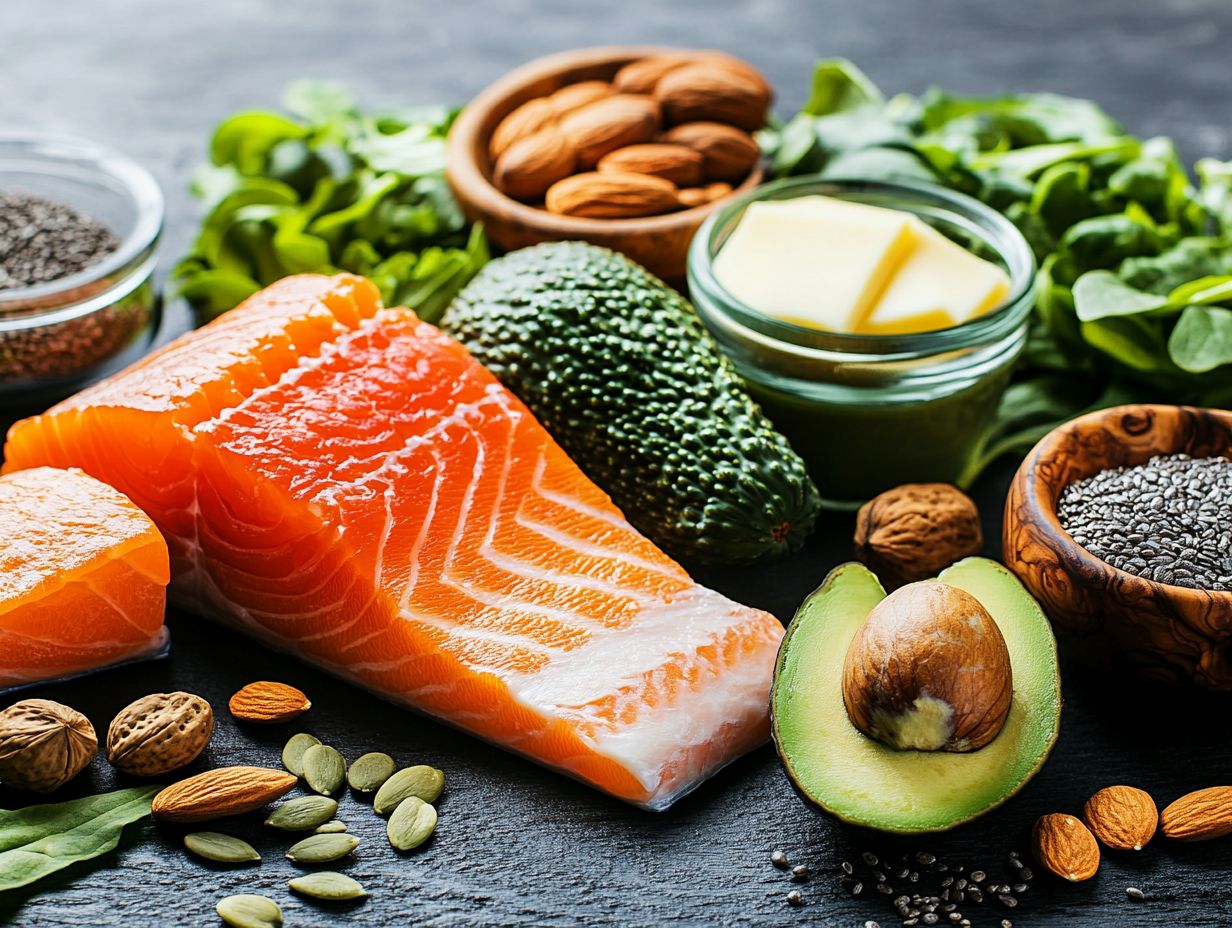
Low-carb vegetables are essential for your ketogenic journey. They offer crucial micronutrients and fiber without disrupting ketosis. Options like leafy greens and cruciferous vegetables are low in net carbs but are packed with vitamins, minerals, and antioxidants. This makes them critical for maintaining overall health and enhancing body composition while following a low-carbohydrate, high-fat lifestyle. These vegetables play a significant role in regulating carbohydrate intake and stabilizing glucose levels.
Incorporating a variety of these healthy options can significantly elevate the health benefits of your diet. For example, spinach and kale are fantastic sources of vitamins A, C, and K. Meanwhile, broccoli and cauliflower boost your fiber intake, supporting healthy digestion. These low-carb vegetables are crucial for keeping your glucose levels in check, which is especially advantageous for anyone aiming to stabilize blood sugar.
The fiber found in vegetables like zucchini and bell peppers contributes to feelings of fullness and nurtures a healthy gut microbiome, promoting better digestion and overall wellness. Emphasizing a diverse selection of these vegetables allows you to enjoy a balanced and nutritious regimen on your ketogenic journey. These vegetables also help manage carbohydrate intake and insulin resistance.
– Leafy Greens (Spinach, Kale, etc.)
Leafy greens, like spinach and kale, are your secret weapons in the ketogenic diet. They are brimming with essential vitamins, minerals, and antioxidants. Their low net carb content makes them perfect allies for maintaining ketosis while boosting overall health and body composition. The high fiber content aids in appetite control and improves insulin sensitivity, making them a key component of your high-fat diet.
These greens are rich in vital micronutrients, such as vitamin K, which supports bone health, and magnesium, essential for muscle function and energy production. Incorporating them into your keto recipes can elevate your culinary experience think vibrant salads, nourishing smoothies, or a creamy soup base.
The high fiber content in leafy greens helps keep you feeling full, which is crucial for managing appetite and reducing the chances of overeating. This makes them a smart choice for anyone focused on weight management. The antioxidants present in these greens combat oxidative stress, enhancing your overall wellness.
– Cruciferous Vegetables (Broccoli, Cauliflower, etc.)
Cruciferous vegetables, such as broccoli and cauliflower, are essential elements of a ketogenic diet. Their low carbohydrate content and high fiber levels offer a plethora of health benefits, supporting body composition and overall metabolic health. These vegetables significantly help manage insulin resistance and stabilize glucose levels, which are crucial for maintaining ketosis and preventing ketoacidosis.
From soups to stir-fries, their adaptability allows you to create an array of culinary delights that fit seamlessly into your meal plan. By incorporating these nutrient-rich options, you can boost your intake of vitamins C, K, and a range of antioxidants vital for maintaining robust health.
Cruciferous vegetables are instrumental in reducing inflammation and enhancing digestion, which is crucial for anyone committed to sustaining balanced nutrient levels while following a low-glucose lifestyle. Embracing these vegetables not only elevates the flavor and texture of your meals but also contributes positively to your long-term wellness goals.
Start including these low-carb vegetables in your meals today to maximize your ketogenic success!
Bell Peppers
Bell peppers are a fantastic addition to your ketogenic diet, delivering a delightful burst of flavor along with essential vitamins and minerals, all while keeping carbohydrates that count towards your daily limit low.
Their impressive antioxidant content supports various health benefits, making them a valuable component of your keto meal plan.
These vibrant vegetables come in an array of colors red, yellow, green, and even purple each offering unique nutritional properties and distinct flavors.
For instance, red bell peppers stand out for their higher vitamin C and beta-carotene content compared to green ones.
By incorporating bell peppers into your keto dishes, you can enhance both taste and nutritional value, adding a satisfying crunch to salads or stir-fries.
Their natural sweetness pairs beautifully with healthy fats like avocado or olive oil, creating a balanced meal.
Whether you choose to roast, grill, or stuff them, these peppers can elevate your keto-friendly plate, ensuring that every bite is not just healthy but absolutely delectable.
High-Quality Proteins
High-quality proteins are essential in your ketogenic diet, serving as the building blocks for muscle while allowing you to maintain a low carbohydrate intake.
By incorporating sources such as grass-fed beef, wild-caught salmon, and organic chicken, you can effortlessly meet your protein needs while supporting your body composition and enhancing your overall health.
These protein sources not only deliver rich amino acids critical for muscle repair and growth but also provide healthy fats that benefit heart health.
Take grass-fed beef, for instance; it s particularly abundant in omega-3 fatty acids, which promote heart health and help reduce inflammation.
Wild-caught salmon is another gem, loaded with essential nutrients like vitamin D and selenium.
Let s not forget organic chicken, a lean option that fits seamlessly into various meal plans, ensuring you enjoy diversity and satisfaction at every bite.
Discover how these amazing proteins can transform your meals! Collectively, these proteins work to regulate your appetite and boost energy expenditure, making it easier for you to stick to your dietary goals.
Try incorporating bell peppers and high-quality proteins into your next meal and experience the delicious benefits they offer!
Grass-Fed Beef
Grass-fed beef stands out as an exceptional source of high-quality protein that seamlessly aligns with the principles of the ketogenic diet. Not only does it deliver essential amino acids necessary for muscle building, but it also boasts higher levels of omega-3 fatty acids compared to conventionally raised beef, thereby supporting overall health and mitigating inflammation.
The unique nutritional profile of grass-fed beef enhances its allure. It is also abundant in vitamins like B12 and essential nutrients such as iron, both of which are vital for maintaining energy levels and overall wellbeing. By integrating this premium beef into your various keto meal plans, you can elevate the flavor of your dishes while adhering to low-carb guidelines, allowing you to savor hearty meals without straying from your dietary objectives.
With its elevated content of conjugated linoleic acid (CLA), a type of fat beneficial for health, grass-fed beef can assist in improving body composition by promoting fat loss while preserving lean muscle. This makes it an excellent choice for anyone looking to optimize their diet for both health and physique.
Wild-Caught Salmon
Wild-caught salmon is an exceptional choice for high-quality protein in your ketogenic diet, celebrated for its abundant omega-3 fatty acids. These healthy fats not only support heart health but also play a critical role in maintaining your metabolic functions, making salmon an ideal option if you aim to lose weight and improve your body composition.
Consuming salmon can also help in the production of ketones, which are substances produced when the body burns fat for energy and are crucial for maintaining ketosis. Incorporating this nutritious fish into your meals offers a wealth of benefits, including essential vitamins and minerals like B12 and selenium, which are vital for energy production and immune function.
Its versatility allows you to create a variety of delicious dishes from grilled fillets and vibrant salmon salads to creamy chowders and even keto-friendly sushi rolls. The high fat content aids in appetite control by promoting satiety, helping you feel satisfied for longer periods and reducing the temptation to indulge in high-carb snacks.
Don t miss out! Adding wild-caught salmon to your diet can elevate your keto journey and boost your health!
Organic Chicken
Organic chicken serves as a lean source of high-quality protein that effortlessly complements your ketogenic diet. It delivers essential nutrients while keeping carbohydrates to a minimum. This protein powerhouse not only helps you maintain muscle but also supports your overall health, enabling you to stay true to your low-carbohydrate, high-fat dietary aspirations. By incorporating organic chicken into your meals, you can boost your energy levels and effectively manage your appetite, making it simpler to keep your caloric intake in check. Packed with B vitamins, particularly niacin and B6, this protein helps your body convert food into energy and enhances brain function.
Whether you prefer it roasted, grilled, or saut ed, organic chicken can be transformed into a delightful array of dishes, from hearty salads to flavorful stir-fries. Its versatility allows you to blend it seamlessly with other keto-friendly ingredients, ensuring your mealtime remains exciting while you stick to your dietary goals.
4. Nuts and Seeds
Nuts and seeds are exceptional companions for your ketogenic diet, providing a delightful balance of healthy fats, protein, and fiber. These nutrient-dense foods help you maintain ketosis, support weight loss, and enhance body composition, making them critical in your keto meal plan.
Each type of nut and seed offers unique benefits. For instance, almonds are packed with vitamin E, while chia seeds boast an impressive amount of omega-3 fatty acids.
Incorporating these foods into your daily meals is a breeze. Simply sprinkle them on salads, blend them into smoothies, or enjoy them as snacks. Keep an eye on the carbohydrate content, as certain nuts like cashews tend to be higher in carbs compared to others like macadamias or pecans.
By mixing up your selections and paying attention to portion sizes, you can enjoy the health benefits of nuts and seeds while staying on track with your ketogenic goals!
Almonds
Almonds are an excellent choice for anyone embracing the ketogenic diet, offering a wealth of healthy fats and protein that aligns perfectly with your nutritional goals. Not only do these nuts provide a delightful crunch, but they also deliver essential nutrients that can support your weight management efforts and enhance your overall health. Rich in vitamin E, magnesium, and fiber, almonds play a significant role in promoting heart health and providing antioxidant protection.
Their low carbohydrate content makes them an exceptional snack for maintaining balanced blood sugar levels. The combination of protein and fiber aids in promoting satiety, potentially leading to a reduction in overall calorie intake.
When you incorporate almonds into your keto recipes, the possibilities are endless. Use almond flour to whip up low-carb treats or sprinkle chopped almonds over salads and smoothie bowls for an added crunch. Their energy-boosting properties ensure you maintain sustained vigor, making them the perfect fuel for your active ketogenic lifestyle.
Chia Seeds
Chia seeds are a great addition to your ketogenic diet. They offer a remarkable blend of healthy fats, fiber, and protein.
These tiny seeds can magically absorb liquid and transform into a gel-like texture, enhancing your meals while supporting both digestive health and feelings of fullness.
By incorporating these little gems into your daily routine, you’ll not only meet your fiber intake but also promote hydration a crucial factor during a ketogenic lifestyle where staying hydrated is key.
Their versatility shines through in smoothies, puddings, or even as egg substitutes in your favorite baking recipes.
For instance, you can whip up a delightful keto-friendly chia pudding by combining chia seeds with almond milk and a low-carb sweetener, letting it thicken overnight. This simple yet nourishing dish fuels your energy levels and keeps hunger at bay, making chia seeds a stellar choice for anyone striving to maintain a balanced and satisfying diet.
Flaxseeds
Flaxseeds are an exceptional choice for anyone following a ketogenic diet or similar low-carbohydrate high-fat diets like the Atkins or Paleo diets. These tiny powerhouses are rich in omega-3 fatty acids and fiber while keeping net carbs exceptionally low.
By including flaxseeds in your meals, you can bolster heart health, support digestion, and enhance your overall well-being. They truly are a valuable addition to your keto repertoire.
Loaded with nutrients, flaxseeds also contain lignans, a type of plant compound with impressive antioxidant properties. They serve as an outstanding plant-based protein source.
You can effortlessly integrate flaxseeds into your diet by adding them to smoothies, incorporating them into baked goods, or sprinkling them over salads all while keeping your carb intake in check.
The high fiber content of these seeds plays a crucial role in appetite control, helping you maintain a sense of fullness and stabilize blood sugar levels. The omega-3s found in flaxseeds may assist in achieving a healthy body composition by promoting fat oxidation.
In this way, they stand as an essential ally for anyone looking to optimize their health on a low-carb lifestyle, including those following the ZOE program.
5. Berries
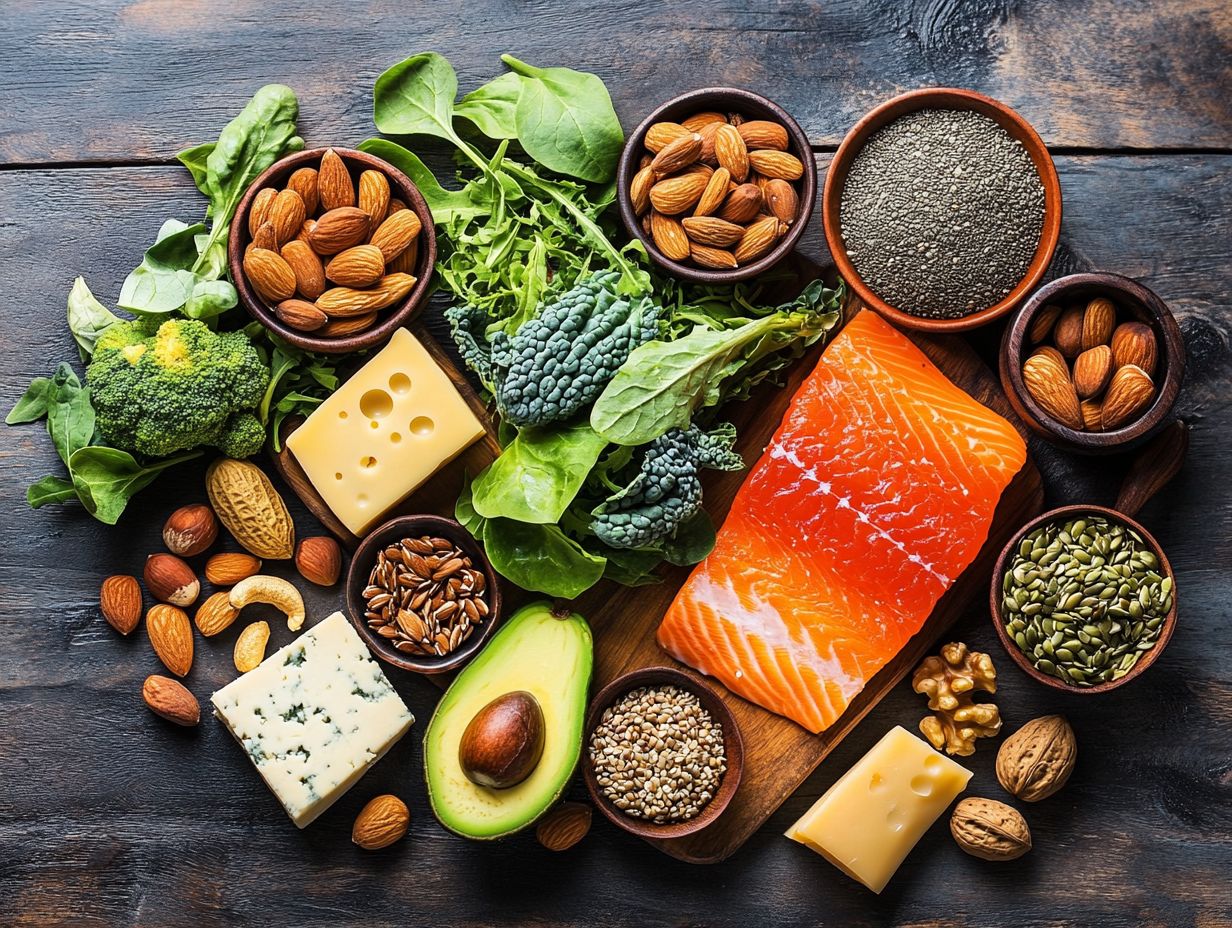
Berries present a delightful and nutritious option within the realm of low-carb fruits, ideal for your ketogenic journey when enjoyed in moderation.
Brimming with antioxidants and essential vitamins, berries such as blueberries, strawberries, and raspberries offer a sweet yet healthful indulgence that supports your overall wellness without jeopardizing your state of ketosis.
These fruits look great and taste even better. They serve as powerful allies in your keto meal plan, delivering a multitude of health benefits.
Rich in fiber, berries help maintain digestive health and promote a sense of fullness an essential factor for anyone looking to manage weight effectively.
Incorporating them into smoothies, salads, or as toppings for low-carb desserts infuses your meals with vibrant flavor and color.
Their natural sweetness invites creativity in the kitchen, allowing you to satisfy your cravings while staying true to your dietary goals. The impressive array of vitamins found in these fruits bolsters your immune health and enhances your overall well-being.
Blueberries
Blueberries are not just delicious; they re a powerhouse of nutrients packed with antioxidants and lower in carbohydrates compared to many other fruits. By incorporating them into your ketogenic diet, you can reap significant health benefits, including enhanced cognitive function and improved heart health.
The antioxidants in blueberries may help reduce the risk of Alzheimer s disease. These tiny gems are renowned for their high levels of anthocyanins, giving them their stunning color and are associated with improved memory and a reduced risk of age-related cognitive decline.
Their versatility is a delight you can toss them into smoothies, sprinkle them on salads, or use them as a topping for low-carb baked goods, making it easy to savor their benefits in style.
Regularly enjoying blueberries can aid in managing blood sugar levels and promote better overall body composition. They truly are an excellent choice for anyone committed to a healthy lifestyle while adhering to a keto diet.
Start adding these delicious berries to your meals today and taste the benefits!
Strawberries
Strawberries present an exceptional choice for those embracing a ketogenic lifestyle, as they are brimming with vitamin C and antioxidants while remaining delightfully low in carbohydrates. Their natural sweetness and versatility make them an ideal addition to a variety of keto dishes and snacks.
Incorporating strawberries into your meal plans can offer both joy and health benefits. They can effortlessly elevate a salad, serve as a refreshing topping for Greek yogurt, or be blended into smoothies for a nutrient-rich indulgence. For those on a high-protein diet, they can also be paired with lean meat options to create a balanced meal.
For a quick snack, you might enjoy them on their own or paired with a handful of almonds, creating a perfectly balanced bite. The high fiber content in strawberries supports your weight loss endeavors by promoting a sense of fullness. By savoring these vibrant berries, you can enhance your overall body composition while relishing their delicious flavor.
Raspberries
Raspberries are a fiber-packed delight that perfectly aligns with your ketogenic diet. Low in net carbs and brimming with essential nutrients, these berries can elevate your culinary creations while supporting your weight loss journey and overall health.
Not only are these lovely berries bursting with flavor, but they also come with a rich nutritional profile. You’ll find significant amounts of vitamin C, manganese, and antioxidants in them, all of which work together to combat oxidative stress. Consulting with a Registered Dietitian can help you better integrate these nutrient-rich berries into your diet.
Incorporating raspberries into your meals can enhance your sense of fullness and satisfy those sweet cravings in a healthy way. You can blend them into smoothies, toss them into salads, or bake them into keto-friendly desserts, making them a wonderfully versatile ingredient. Plus, their low glycemic index makes them an ideal choice for managing your blood sugar levels while still enjoying delicious, flavorful dishes.
Frequently Asked Questions
What is the Keto Diet and why is it important to focus on nutrient sources?
The Keto Diet is a high-fat, moderate-protein, and low-carbohydrate diet that is used to help the body reach a state of ketosis. Focusing on nutrient sources is important because it ensures that the body is receiving enough essential vitamins and minerals while following this restrictive diet.
What are the best nutrient sources for the Keto Diet?
The best nutrient sources for the Keto Diet include high-quality proteins such as grass-fed beef, pastured poultry, and wild-caught fish, healthy fats like avocado, coconut oil, and olive oil, and low-carb vegetables like leafy greens, broccoli, and cauliflower. For more information on optimizing your nutrient intake, check out keto diet key nutrients for optimal health. Diets like the Atkins diet and the Paleo diet also emphasize these nutrient sources.
Can I still get enough nutrients on a Keto Diet without consuming carbohydrates?
Yes, you can still get enough nutrients on a Keto Diet by choosing nutrient-dense foods that are low in carbohydrates. Foods like leafy greens, meat, nuts and seeds, and healthy fats provide essential vitamins and minerals without adding too many carbs.
Are there any specific nutrient deficiencies that can occur on a Keto Diet?
Yes, some nutrient deficiencies that may occur on a Keto Diet include magnesium, potassium, and sodium. It is important to incorporate foods rich in these minerals, such as leafy greens, avocados, and bone broth, or consider taking a supplement if needed.
Can I still enjoy fruits and vegetables on a Keto Diet?
Yes, you can still enjoy fruits and vegetables on a Keto Diet, but it is important to choose lower-carb options like berries and non-starchy vegetables. These foods provide essential vitamins and minerals while still keeping your carbohydrate intake low enough to stay in ketosis.
Are there any Keto-friendly supplements that can help with nutrient intake?
Yes, there are several Keto-friendly supplements available that can help with nutrient intake, such as electrolyte supplements, omega-3 fatty acid supplements, and multivitamins specifically formulated for the Keto Diet. It is always best to consult with a healthcare professional before adding any supplements to your diet.

